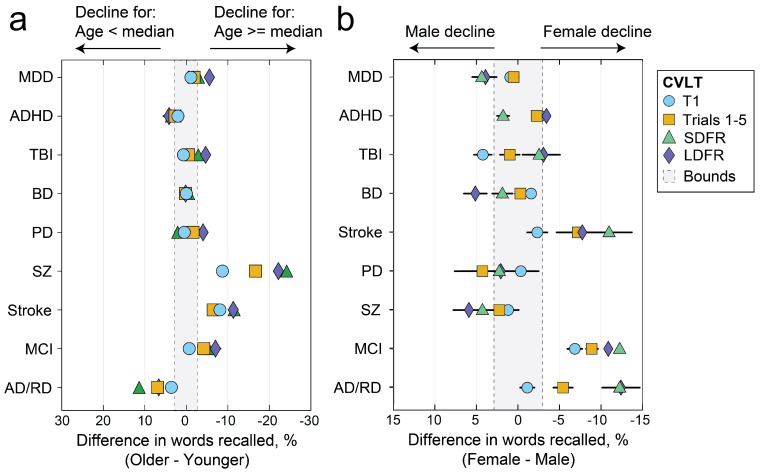
Eamonn Kennedy, PhD, Investigator at the Informatics, Decision-Enhancement and Analytic Sciences Center (IDEAS 2.0), VA Salt Lake City, UT, Health Care System
SALT LAKE CITY — Memory performance is a vital cognitive function crucial for daily life and overall well-being. Impairments in memory are associated with various neurological, neurodevelopmental and neuropsychiatric disorders.
While many studies focus on the memory impacts of individual conditions, a new study takes a broader approach by analyzing data from 55 international studies with 15,883 participants. By examining how memory recall varies across nine common neuropsychiatric conditions, the study offers a foundation for improved diagnostic accuracy and new insights into management for individuals with comorbid conditions with compounding memory effects. It also serves as an example of how taking the time to conduct large global studies can improve the quality and robustness of research findings, said Eamonn Kennedy, PhD, the study’s first author.
While the large-scale nature of the study enabled it to offer a comprehensive perspective that smaller studies can’t, conducting a study of this magnitude was undoubtedly challenging, said Kennedy, investigator at the Informatics, Decision-Enhancement and Analytic Sciences Center (IDEAS 2.0), VA Salt Lake City, UT, Health Care System.
Results were published in the journal Brain Sciences.1
Researchers at the University of Utah had spent the past few years cleaning, combining and harmonizing data across more than 55 related studies, Kennedy told U.S. Medicine, in discussing those challenges. “One massive problem was that the different underlying studies had all used distinct instruments and forms to measure verbal learning and memory,” he said. “We put a huge amount of time into the psychometrics needed to allow us to equate and harmonize everyone’s results across these measures using item response theory.”
Another problem that emerged when integrating the data of so many studies was the impact of so-called “site” or “batch” effects—intangible, systematic differences in how each study was conducted that can bias results, Kennedy said. “For example, tests might be routinely conducted in the morning or evening in different studies, or by a student in one and a trained neuropsychiatrist in another,” he said. “Fortunately, there are sophisticated ways of dealing with nonbiological site-specific artifacts in aggregate using machine learning techniques that don’t require the user to exhaustively itemize all of those possible differences.” To perform those corrections, the researchers used an algorithm called ComBat-GAM, which was developed fairly recently at the Davatzikos lab at U Penn, he said. “After that, it was just a matter of implementing an appropriate analysis.”
After placing all measures on the same scale, the researchers implemented nine parallel matched case-control models of the impact of each condition on verbal learning and memory, adjusting for covariates like age, sex and language.
“One of the advantages of study aggregation is that we had a huge number of controls to match from for each clinical group. Individual studies sometimes had just 50 controls—the pool of available controls for those studies increased by two orders of magnitude after combining subjects from all sites.”
Different Memory Impacts

Click to Enlarge: Age- (a) and sex/gender- (b) stratified percentage score differences across female/male and above/below median age groups relative to matched controls. MDD = major depressive disorder. ADHD = attention-deficit/hyperactivity disorder. TBI = traumatic brain injury. BD = bipolar disorder. PD = Parkinson’s disease. SZ = schizophrenia. MCI = mild cognitive impairment. AD/RD = Alzheimer’s disease and related dementias. T1 = immediate recall trial 1. Trials 1–5 = total score across immediate recall/learning trials 1–5. SDFR = short-delay free recall. LDFR = long-delay free recall.
Source: Brain Sciences
Unsurprisingly, the study found memory deficits were most strongly associated with conditions like dementia and schizophrenia, said corresponding author Emily L. Dennis, PhD, research health scientist with the VA Salt Lake City Health Care System. “Those diseases were also associated with large discrepancies in how immediate, short-, and long-term memory were impacted,” she said. “We also found that traumatic brain injury was associated with consistent declines across immediate, short- and long-term memory measures. We were even more surprised by some of the negative results we found, particularly considering this was a very robust study with few equivalents in terms of sample size. Neither depression nor ADHD showed consistent deficits across all memory measures.”
Dennis said the study would not have been possible without the VA. “We had unbelievable support from authors working at VA [medical centers] across the country, including Palo Alto, Minneapolis, Salt Lake City, North Carolina, Houston and Phoenix,” she said. “Sharing data, in the end we pieced together enough cognitive tests to include about 5000 U.S. servicemembers and veterans. In many cases, the original work that we included in our work was collected with funding from the VA, as well.”
Future Research
“I think this work is a good example of how taking the time to conduct large, global studies can really improve the quality and robustness of research findings, but at the cost of increased complexity,” Kennedy said. He said more broadly that he believes there is merit in trying to frame research questions that mirror the clinical experience.
“The clinical reality of patient care is that disease presentations vary enormously, and even a single patient’s cognitive symptoms rarely align neatly with a single diagnosis,” he said. “This is an unusual study because it directly shows comparable cognitive impacts of nine different common conditions within a single analysis. Our hope is that there is an appetite for that kind of framing among clinic audiences, and we are optimistic that others might follow suit.”
Dennis said she believes the key takeaway from the study is that there are some outcome domains, with memory as a prime example, that are affected to different degrees across a range of conditions.
“In some cases that means there could be some overlap in appropriate interventions, perhaps this highlights some common ethologies across disorders,” she said. “We also teased out which disorders have consistently strong vs. heterogeneous or more mild impacts, which is an important thing to keep in mind when treating some of the more heterogeneous disorders.”
- Kennedy E, Liebel SW, Lindsey HM, Vadlamani S, Lei PW, Adamson MM, et al. Verbal Learning and Memory Deficits across Neurological and Neuropsychiatric Disorders: Insights from an ENIGMA Mega Analysis. Brain Sci. 2024 Jun 29;14(7):669. doi: 10.3390/brainsci14070669. PMID: 39061410; PMCID: PMC11274572.


